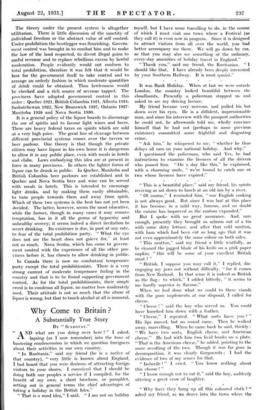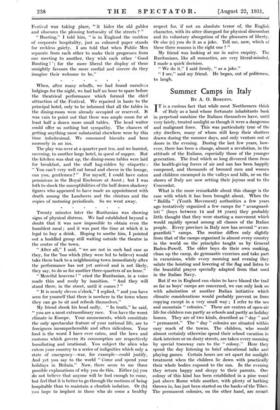Why Come to Britain ?
A Substantially True Story
BY " SCADAVAY."
" AND what are you doing over here ? " I asked, lapsing (as I now remember) into the tone of bantering condescension in which we question foreigners about their activities in our own country.
" In Ruritania," said my friend (he is a native of that country), " very little is known about England. I had heard that you were desirous of attracting foreign visitors to your shores. I conceived that I should be doing both our peoples a service if I compiled, for the benefit of my own, a short brochure, or pamphlet, setting out in general terms the chief advantages of taking a holiday in the British Isles."
" That-is a isood idea," I said. "I am not on holiday myself, but I have some travelling to do, in the course of which I must visit one town where a Festival (as they call it) is even now in progress. Since it is designed to attract visitors from all over the world, you had better accompany me there. We will go down by car, so that you may also see something of the ordinary, every-day amenities of holiday travel in England."
" Thank you," said my friend, the Ruritanian. " I should like that. I have already been deeply interested by your Southern Railway. It is most quaint."
• • • It was Bank Holiday. When at last we were outside London, the country looked beautiful between the cloudbursts. Presently a policeman stopped us and asked to see my driving licence.
My friend became very nervous, and pulled his hat down over his eyes. He is a diffident, impressionable man, and since his interview with the passport authorities he could not, he afterwards told me, wholly convince himself that he had not (perhaps in some previous existence) committed some frightful and disgusting crime.
" Ask him," he whispered to me, " whether he thus delays all cars on your national holiday. And why."
I questioned the policeman, who said Yes, he had instructions to examine the licences of all the drivers who passed him. " On a day like this," he explained, with a charming smile, " we're bound to catch one or two whose licences have expired."
• • • " This is a beautiful place," said my friend, his spirits reviving as sat down to lunch at an old inn by a river.
" Of course," I reminded him, " our English cooking is not always good. But since I was last at this place it has become, in a mild way, famous, and no doubt the cuisine has improved as the custom expanded."
But I spoke with no great assurance. And, sure enough, presently they brought us salmon out of a tin with some dirty lettuce, and after that cold mutton, with ham which had been cut so long ago that it was not even approximately the same colour on both sides.
" This mutton," said my friend a little wistfully, as he cleaned the jagged blade of his knife on a pink paper napkin, " this will be some of your excellent British meat ? "
" British, I suppose you may call it," I replied, dis- engaging my jaws not without difficulty, " for it comes from New Zealand. In that sense it is indeed as British as the flag : to which," I added bitterly, " it seems to me hardly superior in flavour."
When we had done what we could to these viands with the poor implements at our disposal, I called for cheese.
" Cheese ! " said the boy who served us. You could have knocked him down with a feather.
" Cheese," I repeated. " What sorts have you ? " His lips moved, but no sound came. Then he walked away, marvelling. When he came back he said, thickly : " We have two sorts. English cheese, and American cheese." He had with him two livid hunks on a plate. "That is the American cheese," he added, pointing to the more revolting of the two. Though it was far gone in decomposition, it was clearly Gorgonzola ; I had the evidence of two of my senses for that.
" Imbecile ! " I cried. " You know nothing about this cheese ! "
" I know enough not to eat it," said the boy, suddenly uttering a great crow of laughter.
• • • " Why have they hung up all this coloured cloth ? " asked my friend, as we drove into the town where the Festival was taking place, " it hides the old gables and obscures the pleasing tortuosity of the streets ? "
" Bunting," I told him, " is in England the emblem of corporate hospitality, just as coloured paper stands for reckless gaiety. I am told that when Public Men separate from each other to make their progresses from one meeting to another, they wish each other ' Good Bunting 1 ' ; for the more liberal the display of these unsightly favours the more cordial and sincere do they imagine their welcome to be."































 Previous page
Previous page